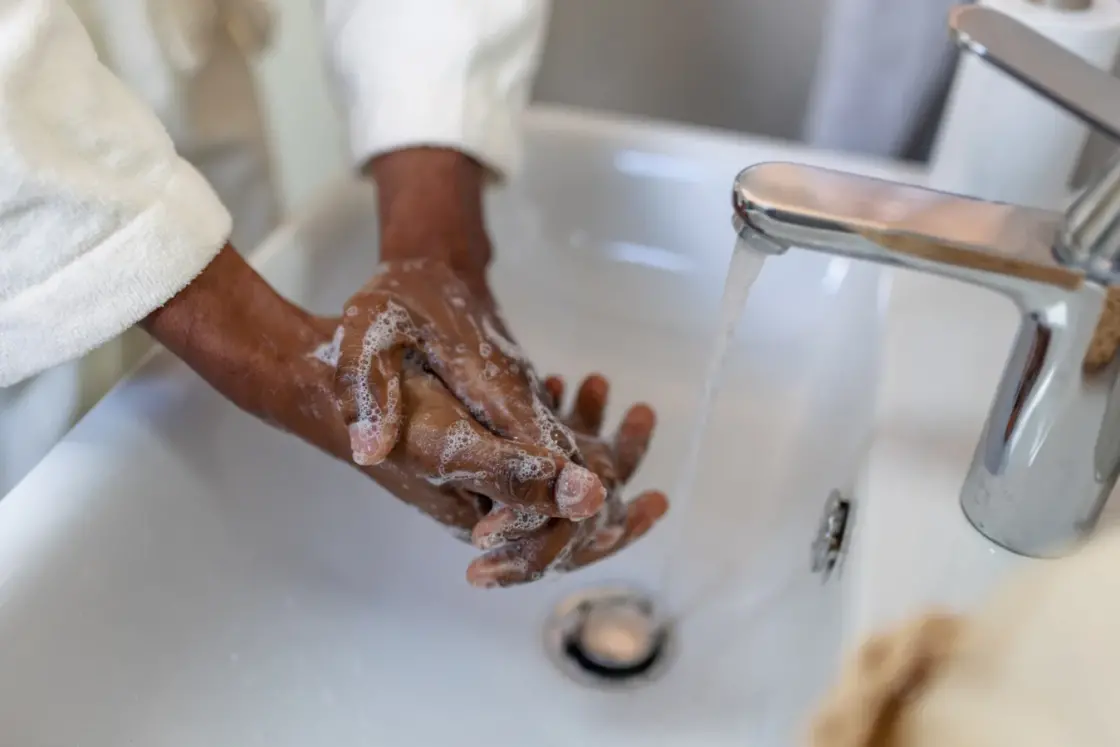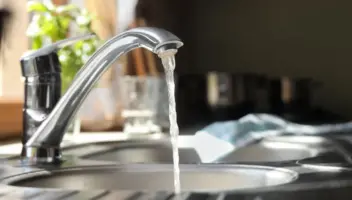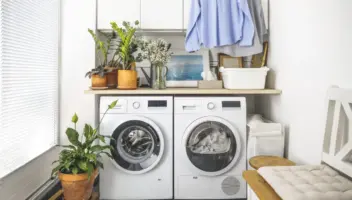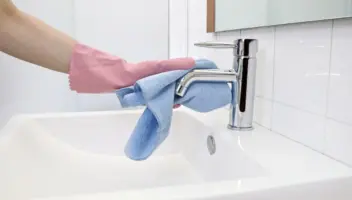What is Soft Water?

Understanding Water Hardness and Its Impact on Your Home and Everyday Life
Have you ever noticed white spots on your dishes, soap scum in the sink, or felt a strange dryness after showering? These are just a few tell-tale signs of hard water.
But what exactly does it mean when we talk about “soft water”? Simply put, soft water is water that has been treated to remove minerals like calcium and magnesium, which cause mineral buildup and damage to your home and appliances.
At Leaf Home Water Solutions, we’re experts in ensuring your water is as clean and safe as possible through reliable water testing and customized water filtration systems.
In this article:
The Difference Between Soft Water and Hard Water
What Are Water Softeners, and How Do They Work?
Disadvantages of Water Softening
Looking for a Reliable Water Softener?
The Difference Between Soft Water and Hard Water
Hard water contains high levels of dissolved mineral deposits, primarily calcium and magnesium. These minerals can accumulate, creating scale buildup in pipes and appliances, leading to inefficiencies and even damage over time. While not a risk to your health, the effects of hard water minerals can wreak havoc on personal hygiene. Here’s how to tell if you have hard water.
Soft water, on the other hand, removes these minerals, providing many benefits for your home and health. Here are a few major differences between soft water and hard water.
Scale Buildup
Scale buildup from hard water can clog pipes, reduce the efficiency of water heaters, and leave unsightly stains on fixtures. This sediment accumulation can lead to costly repairs and replacements.
By using soft water, you prevent water flow issues, extending the lifespan of your plumbing and appliances. Leaf Home Water Solutions offers customized systems designed to keep your home’s water clean and free from harmful buildup, so you don’t have to worry about the wear and tear caused by hard water.
Soap Effectiveness
Have you ever wondered why soap lathers better with some water than others? It’s because hard water makes it challenging for soap to lather and rinse off, according to the University of Nebraska. This is due to the reaction between soap and the high mineral content, which forms a sticky residue.
A similar reaction affects how well laundry detergent works too. Soft water, on the other hand, enhances soap’s effectiveness, requiring less product to achieve thorough cleanliness.
Dry Skin & Hair
One of the lesser-known impacts of hard water contaminants is its drying effect on skin and hair. The minerals in hard water can strip away natural oils, leaving your skin feeling dry and itchy and your hair brittle. And, people with eczema have been shown to be more sensitive to hard water. Soft water, conversely, is gentler on your body, helping maintain moisture and softness. Many people report softer skin and silkier hair after switching to soft water.
What Are Water Softeners, and How Do They Work?
While hard water doesn’t pose health risks, investing in a water treatment softener can significantly enhance your personal comfort and the longevity of your home’s plumbing and appliances. Home water softeners are devices that remove calcium, magnesium, and other minerals that cause hardness of water.
How water softeners work
While there are various types of water softeners, a process called ion exchange is most common. Calcium and magnesium ions are swapped for sodium ions, resulting in soft water. Here’s a simple breakdown of the process:
- Ion Exchange: Resin beads within the softener trap calcium and magnesium ions and replace them with sodium or potassium ions.
- Regeneration Cycle: Once the beads are saturated with calcium and magnesium, a highly concentrated salt or potassium solution flushes the accumulated minerals from the beads.
- Disposal: The resulting chloride solution, now carrying the unwanted minerals, is flushed down the drain and into the environment.
According to the Minnesota Department of Health, ensuring your water softener properly functions is crucial to maintaining these benefits. Regular water softener maintenance and monitoring are essential to keep your system working efficiently. Here’s how you can do it:
- Set the Softener Correctly: Adjust your softener to match the hardness of your water supply, ensuring enough sodium ions are added to replace the calcium and magnesium.
- Monitor Salt Levels: Check the salt levels regularly. Salt is vital for ion exchange, so make sure there’s always enough in your softener.
- Clean the Brine Tank: Over time, salt can accumulate in the tank, reducing its effectiveness. Periodic cleaning can prevent this issue.
- Use Wisely: Soften only water you regularly use. People typically soften sinks, showers, faucets, and laundry hookups. Essentially, hot water sources are a good start for adding a water softener. Consider installing a bypass valve to save on excess water usage during times you’re not home, like vacations.
By following these steps, you’ll ensure that your water softener continues to provide the benefits of soft water. Keep your home’s water system running smoothly protecting large appliances like washing machines and dishwashers.
Disadvantages of Water Softening
While soft water offers numerous benefits, it’s important to be aware of potential downsides. Here are a few disadvantages of water softening:
- Higher sodium content: In the ion exchange process, hard minerals like calcium and magnesium are swapped for sodium ions. This means that your softened water may have a higher sodium content, which can be problematic for those on low-sodium diets or with certain health conditions like high blood pressure. However, there are salt-free softener options available.
- Maintenance and cost: Water softeners require regular upkeep, including salt refills and periodic cleaning. Additionally, the initial installation can be costly. However, the investment often proves worthwhile when you weigh these factors against the long-term benefits—like extended appliance life and softer skin.
- Environmental Impact: The brine discharged from water softeners can affect local ecosystems and water supplies if not managed properly. It’s crucial to handle this waste responsibly to minimize any adverse environmental effects.
Balancing these considerations with the advantages of soft water will help you decide if a water softener is right for your home.
Looking for a Reliable Water Softener?
At Leaf Home Water Solutions, we understand the importance of having clean and safe drinking water for your home. Our advanced water softening systems are tailored to meet your specific needs, ensuring you get the best possible water quality without hassle. Our team of experts will work with you to find the best solution for your home and budget. Let us help you make the switch to soft water and experience the difference.
Contact us today to learn more about Leaf Home’s water softener systems!
Frequently Asked Questions
How to make soft water at home?
Creating soft water at home doesn’t always require expensive systems. Here are a couple of DIY and natural methods you can try:
- Boiling Method: Boil water to reduce hardness by precipitating calcium carbonate, then cool and pour off the softened water.
- Baking Soda: Add ½ cup of baking soda to your laundry to soften water and improve cleaning results.
- Vinegar Solution: Use a mixture of one-part white vinegar to three parts water for rinsing hair or cleaning surfaces affected by hard water.
- Install a Showerhead Filter: Attach a filter to your showerhead to remove minerals and temporarily soften water.
While these methods can offer temporary relief, they may not provide the consistent results that a dedicated water softener system would.
Is distilled water soft water?
Yes, distilled water is considered soft because the distillation process removes minerals like calcium and magnesium. By boiling the water and condensing the steam, distillation ensures that most impurities and minerals are left behind, resulting in soft water.
Is purified water considered soft water?
Purified water can be soft, depending on the purification method used. Methods that remove minerals, like reverse osmosis and deionization, will result in soft water. However, not all purification processes will result in soft water; it depends on whether the method specifically removes hardness-causing minerals.
Is soft water better for you?
Soft water is generally better for cleaning and reducing wear on appliances and plumbing. With fewer minerals, it prevents mineral buildup and improves the effectiveness of soaps and detergents. However, the added sodium from the softening process might not be suitable for everyone, especially those on sodium-restricted diets.


